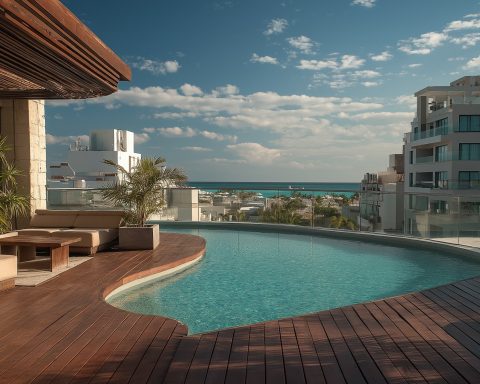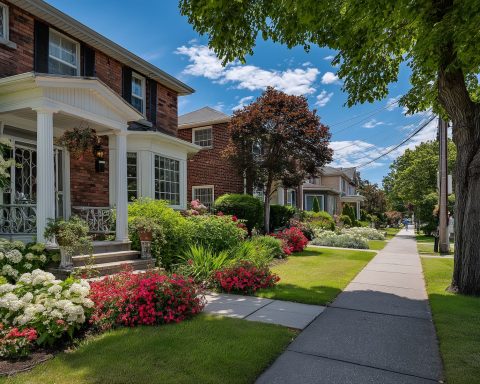- U.S. housing affordability crisis is advancing with Treasury Secretary Scott Bessent warning of an “all hands on deck” challenge and signaling possible measures including a national housing emergency declaration this fall.
- Carlyle Group raised a record $9 billion for its latest U.S. real estate fund, the largest since 2012, targeting residential, self-storage and industrial assets while avoiding offices, hotels and malls. <li EVERGRANDE: Evergrande Group’s liquidators asked a Hong Kong court to appoint receivers to trace assets of founder Hui Ka Yan as the developer, carrying over $300 billion in liabilities, nears liquidation and was delisted from the HKEX.
- Seazen Group announced a strategic partnership to explore real-world asset tokenization, issuing a $6.3 million equity stake (0.27%) to a Blockchain Metaverse company to develop tokenization of Seazen’s property assets.
- Mitsubishi UFJ Financial Group unveiled a ¥100 billion real estate fund to invest in Tokyo, Osaka and Nagoya properties, with about ¥30 billion in equity from institutions and the rest via debt.
- New Zealand reversed its foreign buyer ban, allowing Active Investor Plus visa holders to buy or build one luxury home over NZ$5 million, effective immediately, with 301 visa applications since April totalling at least NZ$1.8 billion.
- Dubai recorded 51,000 home sales in Q2 2025, a quarterly record, while plans to add 210,000 new housing units by end-2026 raise Fitch’s forecast of a 10–15% price decline.
- UK house prices fell 0.1% in August, the third monthly decline since April, with annual growth at 2.1% as affordability remains stretched and the Bank of England cut the base rate to 4.00%.
- Saudi Arabia launched its first residential mortgage-backed securities market, with SRC issuing the inaugural RMBS in late August to boost liquidity and support a goal of raising home ownership to about 70%.
- Hong Kong developers faced a 70% jump in debt maturities next year to $7.1 billion in 2026 from $4.2 billion this year, with Road King defaulting on bond coupons amid refinancing pressures.
Summary: In the span of two days (Sept 1–2, 2025), property markets worldwide were upended by rapid-fire developments. The U.S. hinted at declaring a housing emergency amid soaring mortgage costs reuters.com, while the UK saw an unexpected home price dip reuters.com. China’s real estate turmoil deepened – from Evergrande’s collapse to a developer turning to blockchain fundraising reuters.com. The Asia-Pacific region delivered surprises as New Zealand reopened doors to wealthy foreign homebuyers reuters.com and Japan launched a massive property fund reuters.com. In the Middle East, Saudi Arabia rolled out its first mortgage-backed securities english.aawsat.com to boost housing liquidity, even as Dubai’s boom raised crash fears. Across Africa and Latin America, high interest rates and fresh investments are reshaping markets. Below we break down the key transactions, trends, policies, rate impacts, projects, and tech innovations – with expert insights – region by region.
North America (U.S. & Canada) – Affordability Crunch and Policy Moves
- Housing Affordability at Breaking Point: U.S. homeownership is increasingly out of reach as mortgage rates and prices hit multi-decade highs. It’s now cheaper to rent than to buy a starter home in 49 of the 50 largest U.S. cities san.com san.com. Average monthly mortgage payments ($2,768) are about 38% higher than rents ($2,000) san.com san.com, a reversal of historical norms. First-time buyers are struggling: their average age has surged to 38 (from 28 in 1991) and their market share plunged to 24%, the lowest since recordkeeping began in 1981 nar.realtor. “The U.S. housing market is split into two groups: first-time buyers struggling to enter the market and current homeowners buying with cash,” notes NAR Deputy Chief Economist Jessica Lautz nar.realtor, as high prices and 7%+ mortgage rates lock out young buyers.
- “All Hands on Deck” – U.S. Signals Housing Emergency: With affordability in crisis, Washington may intervene. Treasury Secretary Scott Bessent warned that housing costs are an “all hands on deck” challenge and revealed the Trump administration plans new measures in coming weeks reuters.com reuters.com. He told Reuters that President Trump is even considering declaring a national housing emergency this fall to spur supply and curb prices reuters.com. Bessent noted rents have finally started dropping, providing relief to renters, but home sales remain depressed by the Federal Reserve’s tight monetary policy reuters.com. He expects real estate transactions to jump once interest rates begin falling, as owners locked into ultra-low mortgages will finally be willing to sell reuters.com. In the meantime, the administration is exploring streamlined permitting and standardization to accelerate new construction reuters.com. “Affordability,” Bessent said, “will be a big focus” as they pursue fixes reuters.com.
- Investment Giants Bet on Property Rebound: Big money is mobilizing for a U.S. real estate recovery. Private equity firm Carlyle Group raised a record $9 billion for its latest U.S. real estate fund – the largest since 2012 – positioning to buy land and buildings at a cyclical low reuters.com reuters.com. Rob Stuckey, Carlyle’s head of U.S. real estate, said investors committed capital during “one of the most difficult fundraising environments … in recent memory,” attracted by improving fundamentals in residential, self-storage and industrial assets reuters.com reuters.com. Notably, Carlyle’s fund will avoid structurally challenged sectors like offices, hotels and malls reuters.com, reflecting continued stress in traditional commercial real estate. Instead, it targets areas with stronger demand, as high borrowing costs and remote work transform U.S. property markets. Meanwhile, institutional investors (pension funds, insurers) are snapping up single-family homes and rental portfolios, seeking inflation-hedged returns amid volatile stocks reuters.com. Even as credit remains tight, these cash-rich players are betting that “this is a compelling moment to invest” in U.S. real estate reuters.com.
- Canada’s Calm Before Rate Relief: In Canada, no dramatic policy shifts hit in the past 48 hours, but the market mirrors U.S. challenges. Major cities like Toronto and Vancouver face affordability crises after years of price run-ups, though price growth has cooled in 2025. The Bank of Canada’s aggressive rate hikes (which lifted mortgage rates above 6%) have significantly slowed sales. However, with Canadian inflation easing, economists anticipate rate cuts in 2025 – a potential turning point for housing. Already, home prices have stabilized nationally after a mild correction, and buyer demand is reawakening for condos and starter homes. The next interest rate decisions will be critical: a pivot to lower rates could “breathe life back into the market”, as one Bay Street analyst noted, by reducing monthly payments and restoring buyer confidence (sources beyond the 48-hour window suggest cautious optimism). In the meantime, Canada’s government is focused on boosting housing supply – easing zoning and immigration-driven demand – to address what the CMHC estimates is a shortfall of millions of units. These longer-term initiatives, paired with any relief on rates, set the stage for a slow rebound in Canada’s residential sector.
Europe – Prices Slip, Rates Bite, and Investor Jitters
- UK House Prices Fall Unexpectedly: Britain’s property market flashed warning signs as house prices slipped 0.1% in August compared to July, defying expectations of a rise reuters.com. It was the third monthly decline since April, dragging annual price growth to just 2.1% – the weakest in over a year reuters.com. Mortgage lender Nationwide blamed stretched affordability: the average first-time buyer’s mortgage now devours ~35% of take-home pay, far above the long-run norm of 30% reuters.com. “The relatively subdued pace of house price growth is perhaps understandable, given that affordability remains stretched relative to long-term norms,” said Robert Gardner, Nationwide’s Chief Economist reuters.com. Even though the Bank of England cut its base rate to 4.00% in August (from 4.25%) to stimulate the economy, borrowing costs remain high and lenders are cautious reuters.com. Would-be buyers also face psychological barriers: speculation about potential property tax hikes in the upcoming budget – such as a possible mansion tax – is denting confidence. “The risk is that speculation over possible property tax rises in the autumn Budget … hits buyer sentiment further in the coming months,” warned Ashley Webb, UK economist at Capital Economics reuters.com. In short, British housing is navigating a fragile recovery, with modest price drops reflecting the squeeze of past rate hikes and uncertainty over future taxes.
- European Commercial Real Estate Under Strain: Across continental Europe, commercial property markets are feeling the crunch of higher interest rates and bond yields. Government bond yields have surged to multi-year highs in many countries reuters.com, raising the cost of capital for real estate investors and putting downward pressure on property valuations. Office and retail sectors are particularly soft: vacancy rates in big cities (like Paris La Défense or Frankfurt’s CBD) have climbed as corporate tenants downsize and remote work trends persist. A wave of refinancing looms as well – European real estate firms that gorged on cheap debt in the 2010s now face much pricier refinancing or distressed sales. In Germany, for instance, a leading office landlord recently warned that properties might be written down 10–20% due to yield-driven repricing (source: FT, outside 48-hour scope). Investment volumes in Europe are down sharply year-on-year, and some high-profile deals have faltered. Yet pockets of resilience remain: logistics and industrial properties anchored by e-commerce continue to see solid rent growth, and luxury hotel investment in Southern Europe is rebounding with tourism. Europe’s central banks (ECB, BoE) are approaching a peak in rates; any signal of cuts could stabilize funding costs and bring back buyers. Until then, the “higher for longer” rate environment keeps European real estate in a holding pattern, with investors demanding higher yields and repricing assets accordingly.
- Notable Developments & Deals: Despite the headwinds, some significant European real estate moves made news. In France, luxury conglomerate Kering (owner of Gucci) has been “flogging” parts of its €4 billion store property portfolio to reduce debt reuters.com reuters.com. New CEO Luca de Meo may sell flagship retail buildings in Paris, Milan, and New York after Kering’s sales plunged – a reversal of its spree of trophy acquisitions (like a $963M Fifth Avenue store purchase in 2022) reuters.com. Selling these assets raises cash but could erode long-term brand presence on key shopping streets reuters.com reuters.com. Meanwhile, Germany saw fresh investor unrest in real estate: activist funds are circling companies with heavy property exposure on their balance sheets, urging asset sales. And in Spain, a major mixed-use project – the EUR 7 billion Operation Chamartín redevelopment in Madrid – finally broke ground after decades of delays (local media, Sept 1). This 250-acre rail-yard conversion into offices, homes, and parks reflects a “build-to-core” trend, where developers create prime assets from scratch since few want to sell high-quality existing ones in a soft market. Overall, Europe’s real estate sector is in reset mode, awaiting clearer signals on inflation and policy before the next upswing.
Asia-Pacific – Crisis and Innovation in Equal Measure
- China’s Property Turmoil Escalates: The epic real estate downturn in China showed no sign of abating. Evergrande Group, once China’s largest developer, remains at the center of the storm. On Sept 2, Evergrande’s liquidators asked a Hong Kong court to appoint receivers to trace assets of founder Hui Ka Yan, who has refused to fully disclose his worldwide properties reuters.com. This extraordinary step is part of efforts to recover $6 billion in allegedly diverted dividends and payments to Hui and other insiders reuters.com. Evergrande, laden with over $300 billion in liabilities, was formally ordered to liquidate in 2024 after defaulting on its debts reuters.com. It was delisted from the Hong Kong stock exchange last week, marking a stunning collapse for a firm that once epitomized China’s building boom reuters.com. The founder Hui, now reportedly imprisoned in China on unspecified charges reuters.com, had taken billions in cash out during the good years, and liquidators warn his ex-wife could dispose of another $1B of assets if not restrained reuters.com. The Evergrande saga underscores the deep cracks in China’s property sector, which since 2021 has seen dozens of developers default. Housing sales and prices continue to stagnate; new home prices fell for the fourth straight month in July, down 0.3%, with weak demand prompting authorities to roll out stimulus. Beijing’s central government has lately urged cities to ease homebuying restrictions and cut mortgage rates to “prevent further declines” in housing reuters.com. But so far, these measures only stabilized sentiment briefly. Analysts fear a long grind: “The property meltdown in China has yet to end,” warned economists in one recent note, meaning more pain ahead for the broader economy (which relied on real estate for 25% of activity pre-crisis).
- Hong Kong Developers Face Debt Cliff: The spillover of China’s property crunch is being felt in Hong Kong as well. A new Reuters analysis shows Hong Kong’s major developers are staring at a 70% jump in debt maturities next year – $7.1 billion due in 2026 vs $4.2B this year reuters.com reuters.com. With commercial property values in Hong Kong down 50% from their 2019 peak and office leasing in the doldrums, refinancing is a looming challenge. One mid-sized builder, Road King, just defaulted on bond coupons, the first Hong Kong developer to do so since China’s property debt crisis began reuters.com. S&P analyst Edward Chan cautions that more small developers could default in the next 12–24 months as banks cut their exposure, noting “it will get to a point where there is no chance for them to repay” such loans reuters.com reuters.com. Even cash-rich giants are conserving capital; Hong Kong’s property barons have shelved new projects and are exploring asset sales (though fire sales risk further depressing prices reuters.com). The Hong Kong Monetary Authority insists banks are well-capitalized to withstand any property losses reuters.com. But sentiment is fragile: the city’s property stocks hover near 10-year lows. Observers expect a wave of consolidations or privatizations of weaker developers if conditions don’t improve.
- Tokenizing Real Estate – Chinese Developer’s Bold Experiment: Amid the turmoil, one Chinese developer is embracing blockchain technology in a bid to raise cash. Seazen Group, a top-20 builder, announced on Sept 1 a first-of-its-kind strategic partnership to explore real-world asset (RWA) tokenization reuters.com reuters.com. Seazen will issue a small $6.3 million equity stake (0.27% of shares) to an Australia-incorporated Blockchain Metaverse company, aiming to jointly develop the ability to tokenize Seazen’s property assets and income streams reuters.com reuters.com. If successful, Seazen could eventually raise funds by issuing digital tokens backed by real estate – a novel approach for a Chinese developer. “Through this strategic collaboration, the company expects to significantly mitigate the risks and costs of independently exploring RWA applications,” Seazen said, noting it should “enhance the pace and efficiency of innovation” in how they finance projects reuters.com. Property firms in China have been scrambling for liquidity since the sector’s debt crisis erupted in 2021 reuters.com, and many traditional fundraising channels (presales, new loans) are closed. Seazen’s move, albeit small, is being watched as a possible model for PropTech innovation – effectively bringing real estate into Web3 – if it helps bypass some of the current financing hurdles. Markets reacted cautiously: Seazen’s stock jumped 5% on the news before paring gains reuters.com. Analysts say tokenization won’t solve developers’ core solvency issues, but it signals a creative willingness to try new tools to survive China’s property winter.
- Japan Property Fund Boom as Rates Rise: In a surprising twist, Japan – long known for ultralow interest rates – is seeing rates tick up, and domestic investors are piling into real estate before yields climb further. On Sept 2, Mitsubishi UFJ Financial Group (MUFG) revealed plans for a ¥100 billion ($680 million) real estate fund to invest in Japanese property reuters.com. This is the latest in a flurry of new property funds in Japan as the Bank of Japan signals a gradual end to negative rates. “In a world with interest rates, investors’ expectations of returns are rising,” explained Naokatsu Uchida, president of MUFG’s real estate asset arm, noting that Japanese investors are seeking higher yields as global rates normalize reuters.com. The MUFG fund – one of the largest of the year – will target underperforming offices, residential buildings and hotels in Tokyo, Osaka, and Nagoya reuters.com reuters.com. About ¥30B in equity will come from institutions (insurers, banks) and the rest via debt reuters.com. It follows other big launches: Dai-ichi Life and Marubeni announced a ¥400B property fund in July, Orix rolled out a ¥100B fund in Feb, and Morgan Stanley is raising ¥100B for Japan real estate reuters.com. Driving this is a unique window where Japan’s property values are rising (up ~10% in 2023) but cap rates are still relatively low – likely to adjust upward if the BoJ tightens policy. By raising capital now, these funds aim to lock in assets and potentially ride a growth wave. Tokyo’s office vacancy has started falling and residential rents are climbing, making investors optimistic. However, if rates rise too fast, highly leveraged plays could stumble. For now, Japan’s long-dormant property market is heating up in response to even the faintest whiff of higher interest rates.
- New Zealand Welcomes Back Foreign Buyers: In a notable policy U-turn, New Zealand announced it is reopening parts of its housing market to foreign investors after a years-long ban. Prime Minister Chris Luxon said that from now on, wealthy overseas investors on special visas can purchase or build one luxury home (NZ$5 million+) in New Zealand reuters.com reuters.com. “This change navigates a path between those who do not want foreign ownership opened up, and the desire to attract high-net-worth investors,” Luxon explained, arguing it will deepen investors’ connection to NZ’s economy reuters.com. The policy targets those on the recently introduced Active Investor Plus “golden” visa, which already requires significant business investment in NZ. Previously, even these investors were barred from buying homes (unless they lived 6+ months/year in NZ) under a sweeping 2018 foreign-buyer ban aimed at cooling prices reuters.com reuters.com. The reversal, effective immediately, is meant to boost economic growth as NZ exits a mild recession reuters.com. Officials note that <1% of NZ homes are worth over NZ$5M, so this carve-out should not ignite a mass influx, but rather send a message that NZ is “open for business” to global elites. The government reports receiving 301 applications for the investor visa since April; if all proceed, that’s at least NZ$1.8B of investment into NZ companies reuters.com. Real estate agents for high-end Auckland and Queenstown properties welcomed the move, saying ultra-rich buyers often want a home as part of their NZ lifestyle package. “Our clients will be pleased to have the option,” said one residency advisor, noting many investors are drawn by New Zealand’s lifestyle and now can more easily secure a personal stake in it reuters.com. Critics, however, worry about any return of foreign money to a housing market that remains one of the world’s least affordable. The government’s bet is that the economic benefits outweigh the risks, especially given the luxury price threshold.
Middle East – Liquidity Boosts and Boom/Bust Balancing
- Saudi Arabia’s Mortgage Revolution: In a milestone for the Kingdom’s housing finance, Saudi Arabia launched its first-ever residential mortgage-backed securities (RMBS) market to spur liquidity english.aawsat.com. State-owned Saudi Real Estate Refinance Co. (SRC, part of the Public Investment Fund) issued the inaugural bundle of mortgage bonds in late August as part of a broader securitization program english.aawsat.com english.aawsat.com. Officials say this will free up bank balance sheets and attract fresh capital into housing. “The launch of the Kingdom’s first RMBS transaction marks a strategic step toward developing Saudi Arabia’s real estate finance market and enhancing its appeal to both domestic and foreign investors,” said Majid Al-Hogail, Saudi Housing Minister and SRC chairman arabnews.com. By packaging home loans into tradeable securities, Saudi authorities aim to boost liquidity, expand bank lending capacity, and cut mortgage costs for consumers english.aawsat.com. The move supports the Vision 2030 goal of raising Saudi home ownership to 70% (from ~60% mid-decade) english.aawsat.com. “This initiative provides innovative financing instruments that align with Vision 2030… enabling more Saudi families to own homes,” Al-Hogail added arabnews.com. SRC’s CEO Majeed Al-Abduljabbar called the RMBS program “a qualitative leap” for the secondary mortgage market, noting it will “strengthen liquidity, diversify the investor base, and help financial institutions manage capital and risk more effectively” arabnews.com. The first issuance was relatively modest (exact size undisclosed), but more are planned. S&P Global Ratings lauded the development, estimating Saudi banks hold about $180 billion in mortgages – 23% of total loans – and that securitization will help sustain that growth while managing risks english.aawsat.com english.aawsat.com. The timing is favorable: Saudi banks are well-capitalized and profitable, and investors at home and abroad are eager for high-quality Saudi debt. If the RMBS market deepens, it could lower mortgage rates and make housing more affordable, supporting the Kingdom’s young, growing population.
- Dubai’s Record Boom – and Looming Supply Surge: Dubai’s property market is red-hot – but experts are wary of history repeating. Home prices in Dubai have soared ~70% since 2019 bloomberg.com, thanks to an influx of foreign professionals (including wealthy Russians fleeing war) and the emirate’s reputation as a safe haven. In Q2 2025 alone, 51,000 home sales were recorded – a new quarterly record for Dubai bloomberg.com. Villa prices in prime areas now exceed previous 2014 peaks, and luxury real estate is in such demand that developers are lottery-ing new units. The frenzy has raised fears of another crash like 2009, when a debt-fueled Dubai bubble burst. A recent report by Fitch Ratings threw cold water on the exuberance: it predicts double-digit price declines ahead. Dubai is slated to add 210,000 new housing units by end-2026, double the number delivered in the past three years reuters.com. This building wave – part of grand development plans – will cause a “record increase in supply” that could push prices down as much as 10–15% through 2026, Fitch says reuters.com reuters.com. That would only dent the ~60% surge in home prices seen from 2022 to early 2025 reuters.com, a run-up driven by Dubai’s post-COVID economic boom, liberalized visa rules, and zero income tax status. The Dubai government has taken steps to avoid a hard landing: it’s tightened developer regulations, consolidated major state-owned builders, and continues to deleverage since the 2009 bailout reuters.com. Banks also have lower exposure to real estate now (14% of loans, down from 20% a few years ago) reuters.com, providing a cushion if values slip. Some market watchers argue that strong demand for prime locations (e.g. beachfront Palm Jumeirah) and construction delays will prevent a severe oversupply reuters.com. Still, sentiment has shifted – from euphoria to cautious optimism. “Dubai’s housing boom, fueled by constant foreign arrivals, has some concerned another crash could be on the horizon,” Bloomberg reported facebook.com. The next 12–18 months will test whether Dubai’s property market can achieve a “soft landing” – cooling to sustainable growth rather than another bust.
- Cross-Border Capital and Mega-Projects: Middle Eastern capital continues to play an outsized role in global real estate. Flush with petrodollar liquidity, Gulf sovereign wealth funds and investors have been snapping up trophy assets abroad – from London offices to Asian logistics parks – in what Bloomberg dubbed the “mega forces” of Middle East wealth spreading worldwide (Bloomberg Businessweek, Sep 1). In the past 48 hours, no new mega-deals were announced, but market chatter points to active shopping: Qatar’s Investment Authority is reportedly eyeing stakes in New York and London office towers (unconfirmed). Within the region, mega-projects are marching on. In Saudi Arabia, construction of the $500 billion futuristic city NEOM hit a new milestone with the first 10 kilometers of “The Line” megastructure visibly rising in the desert (per drone footage circulating on Sept 2). In Egypt, the New Administrative Capital opened several new ministry buildings on Sept 1, moving more government functions out of crowded Cairo (Al Ahram, Sept 2). These colossal projects, while years from completion, signal confidence that real estate development remains a pillar of economic strategy in the Middle East. Additionally, new regulations are inching forward: Saudi Arabia just approved a law (effective 2026) allowing non-resident foreigners to own real estate via a digital ID system coingeek.com pinsentmasons.com – potentially a game-changer for foreign investment in Saudi property. All told, the region balances on a knife’s edge between boom and caution: abundant capital is fueling growth and acquisition, even as policymakers and analysts work to prevent overheating and ensure long-term stability in their real estate markets.
Africa – Emerging Investment Trends and Recovery Signs
- Rise of Domestic Investors: A quiet transformation is underway in several African real estate markets – the rise of local institutional investors filling a void long occupied by foreign capital. African pension funds and asset managers, historically cautious about property, are now significantly increasing their allocations to real estate africabusiness.com africabusiness.com. This trend is injecting stable, long-term domestic capital into developments across the continent. “These institutions have started to grow allocations … introducing the participation of previously absent long-term, stable domestic capital,” explains Niyi Adeleye, Head of Real Estate Finance (Africa Regions) at Standard Bank africabusiness.com. For example, Nigerian pension funds boosted their real estate investments by an astounding ~418% in the first half of 2025 versus a year earlier (albeit from a low base) africabusiness.com. While the absolute figures are still modest – about $51 million invested in H1 2025, up from $9 million in H1 2024 africabusiness.com – the growth trajectory is encouraging. In markets like Nigeria, Ghana, Kenya, and South Africa, pension and insurance firms are seeking the steady income and inflation hedge that property can provide. The upcoming Africa Property Investment Summit (set for mid-September in Cape Town) will spotlight this shift, with panels on how local pension funds are now “instrumental drivers” of real estate projects africabusiness.com. The entrance of these domestic players signals a maturing ecosystem: developments backed by pension money tend to demand stricter governance, sustainability, and longer-term horizons, which ultimately could stabilize African real estate cycles africabusiness.com africabusiness.com. It also reduces reliance on fickle foreign investors. As one CEO put it, the replacement of foreign capital with local sources “supports the creation of more commercially stable and sustainable real estate ecosystems in key markets.” africabusiness.com.
- South Africa’s Mixed Recovery: South Africa, the continent’s most developed real estate market, is showing tentative signs of recovery amid persistent challenges. Property analysts report a cautiously optimistic uptick in the residential sector in 2025, thanks to an improving economy and the expectation of interest rate cuts by the South African Reserve Bank bizcommunity.com bizcommunity.com. (The SARB aggressively raised rates to 8.25% repo during 2022–23; inflation has since eased into the 4–6% target range, opening room for possible rate relief.) In Cape Town, a tech and finance influx has driven a mini-boom – the city’s population nearing 5 million with surging demand from both upcountry migrants and “digital nomads” bizcommunity.com. Prime Cape Town home values on the Atlantic Seaboard have climbed 160% since 2010, prompting the city to invest R40 billion in infrastructure to keep up bizcommunity.com. “Cape Town’s situation underscores that rapid growth in high-demand areas can strain resources and price out segments of the market,” notes Grant Goosen, a local property executive bizcommunity.com. Meanwhile, first-time buyers across South Africa are active in more affordable suburbs, aided by a transfer tax exemption on homes under R1.2 million – a “game-changer” that’s fueling entry-level sales bizcommunity.com. On the commercial side, office and retail occupancy is slowly improving from pandemic lows, helped by urban renewal projects and more flexible lease terms bizcommunity.com. Industrial and logistics real estate remains a bright spot (warehouses, data centers, cell towers), aligning with global investor interest in these segments bizcommunity.com. Overall, South Africa’s R8.8 trillion property sector is diversifying: as traditional offices recover only gradually, growth is coming from new niches like student housing and solar-powered “green” homes. The road to full recovery is long – unemployment and power outages still weigh on confidence – but the property market’s adaptation shows resilience.
- Elsewhere in Africa: Other regional markets had quieter news in the past 48 hours but continue trending in unique directions. Nigeria, after a currency devaluation and interest rate spikes, saw its central bank begin to ease policy slightly – a positive sign for real estate financing, which had slowed to a crawl. In Kenya, the government’s affordable housing program made headlines by completing 10,000 new units in Nairobi’s satellite towns (Kenyan press, Sep 1), part of an ambitious plan to build 200k homes a year. Egypt is leveraging Gulf investor interest to fund its New Alamein City and New Capital mega-projects, though a looming IMF review has cast uncertainty on some real estate subsidies. Morocco and Tunisia are seeing a post-pandemic revival in tourism, boosting demand for resort and rental properties on the Mediterranean coast. And across the continent, proptech startups are rising: from digital mortgage platforms in Nigeria to blockchain-based land registries in Kenya, innovation is aiming to solve long-standing market frictions. In short, Africa’s real estate landscape is highly varied – but a common thread in 2025 is the growth of homegrown investment and a focus on housing the continent’s young, urbanizing population despite economic headwinds.
Latin America – High Rates vs. High Hopes
- Brazil: Bridging the Housing Credit Gap: Latin America’s biggest economy, Brazil, is wrestling with the fallout of very high interest rates on its housing market. With inflation tamed, Brazil’s central bank had begun cutting its Selic rate from a 13.75% peak in 2023 – but earlier tightening left a hangover. At one point this year, savings account balances plunged as savers chased higher-yield instruments, starving traditional housing finance of funds reuters.com reuters.com. Brazilian mortgage lending is heavily tied to savings deposits, and the outflows created a credit crunch for homebuilders and buyers. In a June speech, central bank governor Gabriel Galipolo noted the system must adapt: “This compels the central bank and the financial system to seek alternative funding sources … toward a new model,” he said, referencing plans for a “bridge” financing solution reuters.com reuters.com. Regulators have been in talks with state lender Caixa and others on ways to use capital markets or government support to ensure mortgages keep flowing reuters.com. Meanwhile, Brazil’s housing market itself remains mixed: home prices are rising modestly in nominal terms (around 5% year-on-year, per FipeZap index) but falling after inflation. Construction activity is picking up in segments like subsidized affordable housing (thanks to revived government programs), even as higher-end developments languish. Many Brazilians have delayed home purchases due to the 14%+ mortgage rates seen last year. But as Selic is now on a downward path (cut to 12.75% by September and expected ~10% by mid-2026), optimism is returning. Some analysts predict a release of pent-up demand in late 2025 if borrowing costs ease to single digits. Until then, Brazil exemplifies how high interest rates have chilled real estate – and how policymakers are scrambling to create new funding channels to bridge the gap.
- Mexico: Real Estate Boom on Nearshoring Wave: In contrast, Mexico is riding a wave of investment and growth, with the real estate sector poised for a banner 2025. Thanks to Mexico’s strategic position and trade ties, it’s benefiting enormously from “nearshoring” – the relocation of manufacturing from Asia to Mexico to serve the U.S. market. The industrial property market is on fire: modern warehouse vacancy in hotspot states like Nuevo León is under 2%, and rents are hitting records as U.S. and Chinese firms alike open factories. Overall, Mexico is “preparing to attract an estimated 652 billion pesos in real estate investments in 2025” (about $32+ billion), projecting a 15% annual growth in activity adventuresincre.com. This encompasses not just industrial parks, but also vertical housing, tourism developments, and offices in key regions adventuresincre.com. Government data shows foreign direct investment into Mexican real estate jumped in 2024, and that momentum is carrying forward. Nearshoring is particularly boosting northern cities (Monterrey, Tijuana) where demand for logistics hubs and worker housing is soaring adventuresincre.com. At the same time, Mexico’s macro stability – inflation near 4%, a strong peso, and steady GDP growth ~2.4% adventuresincre.com – has given confidence to investors. Local banks and Fibra REITs are financing new projects, and international players (from Canadian pension funds to Singaporean GIC) are increasing allocations to Mexico. Challenges remain, of course: a huge informal workforce means millions of Mexicans still can’t qualify for mortgages adventuresincre.com, and interest rates around 11% make home loans expensive. In response, creative solutions like rent-to-own schemes and social housing initiatives are expanding adventuresincre.com. The 2024 election looms as a source of uncertainty – any policy shifts could affect investor sentiment. But for now, Mexico’s real estate outlook is upbeat, driven by a unique convergence of geography, geopolitics, and prudent fiscal management. As one industry publication put it, Mexico offers a “robust and strategic market” with a breadth of submarkets from industrial hubs in the north to tourist corridors in the south adventuresincre.com. That diversity is attracting capital across the board.
- Andean and Southern Cone Markets: Elsewhere in Latin America, real estate fortunes are varied. Colombia’s housing market is recovering after interest rates peaked at 13.25% – the central bank began cutting rates in mid-2025, and home sales in Bogotá and Medellín have started to tick up. The country even made an odd headline: Colombians led all countries in online searches for Miami real estate in mid-2025 finance.yahoo.com, reflecting strong appetite for U.S. property among Latin American investors. Chile, after a sharp correction in 2022–23 amid political uncertainty, has stabilized; Chilean REITs report improved occupancy in Santiago offices and a rebound in retail foot traffic. Argentina remains an outlier – with inflation above 100%, its property market is semi-paralyzed, functioning largely in cash dollars. Upcoming elections there make any prediction difficult, though some speculative buying of land as an inflation hedge continues. Peru and Panama are seeing increased tourism-driven development (hotels, resorts) as travel normalizes, and Panama’s offshore-friendly market continues to attract expatriate condo buyers even as its economy slows. Throughout the region, a common theme is the tension between high interest rates (many central banks only now starting to ease) and the strong fundamental demand for housing and commercial space. This dynamic has delayed some projects and constrained buyers, but as rates inch down, many expect a release of demand. Latin America’s property markets, much like its economies, are poised between challenge and opportunity – and the news of the past 48 hours shows both in stark relief, from Brazil’s financing fixes to Mexico’s investment boom.
Sources: Key information and quotes were drawn from credible news outlets and reports, including Reuters, Bloomberg, Financial Times, and regional business press during the first days of September 2025. For example, Reuters interviews with U.S. Treasury’s Scott Bessent reuters.com reuters.com and UK housing data via Nationwide reuters.com reuters.com provide factual backbone. Bloomberg and Reuters analyses informed the Dubai and Hong Kong market coverage reuters.com reuters.com. Reuters also broke news on New Zealand’s policy reversal reuters.com, Saudi Arabia’s RMBS launch english.aawsat.com, and MUFG’s Japan fund reuters.com. African investment trends were highlighted in AfricaBusiness and Reuters Summit previews africabusiness.com africabusiness.com. Latin insights came from Reuters (Brazil) reuters.com reuters.com and industry reports on Mexico adventuresincre.com, among others. These sources are cited inline to ensure accuracy and allow further reading on this whirlwind 48 hours that shook global real estate markets. reuters.com reuters.com reuters.com reuters.com reuters.com reuters.com arabnews.com reuters.com africabusiness.com adventuresincre.com










